Ohio State Remodels the Fisher Full-Time MBA Program
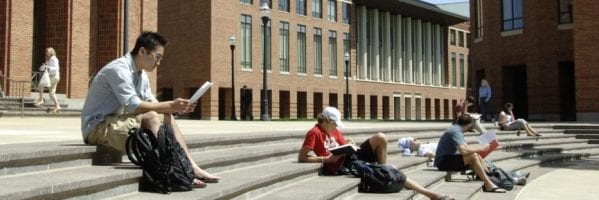
Just as 2018 draws to an eventful close, the Max M. Fisher College of Business at Ohio State University has announced a major remodeling of the Ohio State MBA.
The New Ohio State MBA
According to a new release from the school, the new Ohio State MBA “takes advantage of Fisher’s strong relationships with employers and recruiters to cultivate career competencies sought by organizations.”
Flexibility and tailoring the curriculum directly to student needs is the primary emphasis of the newer MBA model:
“Students will undergo an assessment at the beginning of their MBA experience to identify their strengths and skills gaps. Their program builds on these strengths to close the gaps so they earn an MBA that fits and distinguishes them in the marketplace.”
This MBA curriculum also “incorporates immersive, cross-functional projects with top companies and organizations locally and globally.” These changes include a Global Applied Projects to enhance international experience and exposure, a Business Lab Project to get hands-on experience with major local companies, and a Core Capstone Experience at the conclusion of the program.

Fisher College of Business Dean and John W. Berry, Sr. Chair in Business, Anil K. Makhija, says, “Continuous innovation is a priority which is explicitly highlighted in the college’s strategic plan. This innovation guides our approach to how all of our programs are delivered.”
Fisher’s full-time MBA Co-Director Roger Bailey, when discussing the new changes, says, “The data-driven approach to this redesign has yielded a full-time MBA program that is able to maximize the potential of each student. We are excited about how these many changes leverage Fisher’s strengths, and the increased value it will provide to our students, our alumni and the greater business community.”
News of the school’s changes to the full-time MBA come just one year after it adjusted its highly-regarded Working Professionals MBA; its part-time format counterpart. In 2017, Ohio State added a weekend option to the program, which previously only featured a weekday evening schedule.
The new Ohio State full-time MBA also arrives just 12 months after Fisher introduced its 10-month Specialized Master in Business Analytics program.
For more information on the recently revitalized Ohio State MBA and its other programs, head over to the official school website.
Georgetown McDonough MBA Admissions Answers 5 Questions
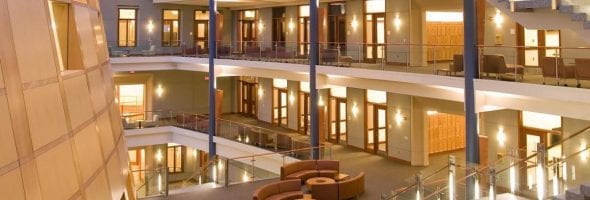
In our latest installment of the MetroMBA “5 Questions” series, we speak with Shelly Heinrich, Associate Dean, MBA Admissions and Director of Marketing at Georgetown University’s McDonough School of Business. She was kind enough to respond to our questions and share insight into what it’s like to attend McDonough for an MBA.
1. How does Georgetown McDonough help MBA students pursue their special interests?
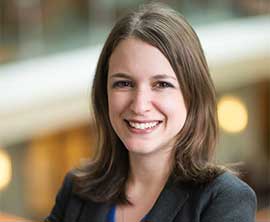
Shelly Heinrich, Associate Dean, MBA Admissions and Director of Marketing
“One of the reasons Georgetown McDonough stands out is because our students have diverse industry interest areas. We are not a school that places half in consulting and half in finance. While these certainly are the largest areas our students pursue, close to 53 percent are seeking careers in the following industries: technology, consumer products, healthcare, hospitality, manufacturing, nonprofit/social impact, real estate, and government. Technology, in particular, is our third highest career placement industry.
Another way students can pursue special interests is with our customizable curriculum. After students in our full-time and Flex MBA complete their core, they can choose from over 100 electives and don’t have to declare a concentration. We believe this is key because every job requires people to wear multiple hats and have multiple skill sets. So, if we were a school that forced students into certain classes, they wouldn’t be able to build a skill set that addresses the multiple knowledge gaps they are seeking to fill.
Additionally, MBA students can leverage the rest of Georgetown University, taking up to 12 credit hours of electives at another Georgetown graduate program or even 6 of those 12 credit hours at partner institutions in the DC metro area.”
2. What makes Georgetown McDonough a special place for you?
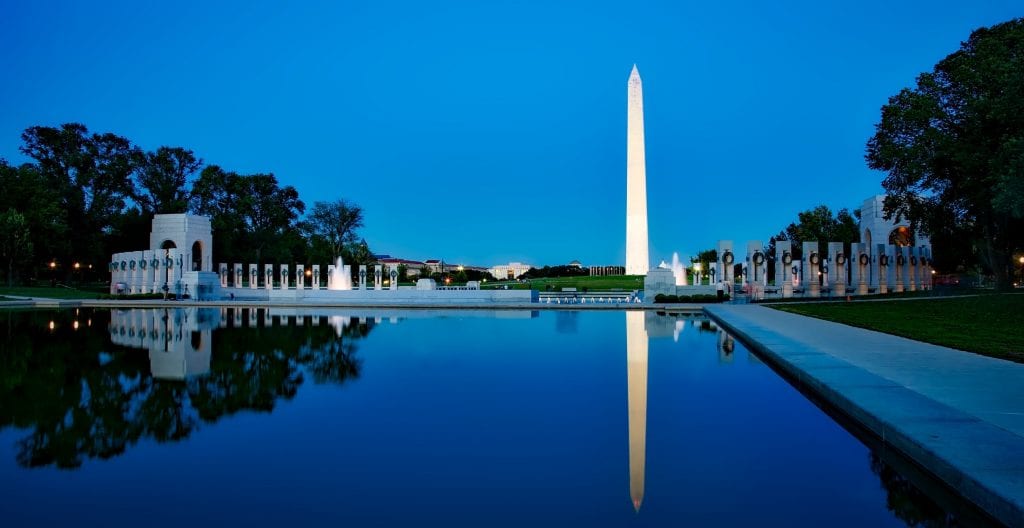
Overlooking the Washington Monument, located just one mile away from the Georgetown University McDonough School of Business campus.
“I experienced what makes Georgetown McDonough special even prior to starting to work here over four years ago. I’ve been living in the DC area for over ten years now and have worked at four other business schools. Throughout my professional and personal life, anytime I engaged with someone who worked, taught, or went to school at Georgetown McDonough, their eyes lit up or ‘sparked’ when talking about their experience. They spoke about their time as if they wanted to be back on campus, reliving their experience. When I received the offer to work here, a former staff member of McDonough reached out to me with congratulations and encouragement and said, ‘I loved my time there. It’s such a special place, and you’re going to love it.’
From day one, I have understood the spark. We have a phenomenal community. Students are high caliber, love their community, and embody the Jesuit values of men and women in service to others. Faculty and staff are committed to the continued growth of the program, and the evidence of this is our continued rise in rankings, the profiles of our incoming students, and our employment results. Also, our alumni are committed to giving back and helping fellow Hoyas.
Four years later, I still love coming to work every day. The buzz and energy of the Hariri building is invigorating and I am always excited to celebrate the weekly or even daily accomplishments of our community.”
3. What does your ideal MBA candidate look like?
“Our ideal candidate has executive presence, grit, diverse personal and professional life experiences, a global mindset, and a generosity of spirit. We want students who will come to Georgetown McDonough and leave a mark, finding their niche in the student community and leaving a legacy that will be experienced by future cohorts and classes.
But, to answer the question that your readers are likely looking for, we certainly look for students with a class profile similar to our recent incoming class. These are students with a strong academic background, professional and personal experiences that can add value to the classroom conversation, and a strong commitment to understanding and appreciating a diverse classroom experience. Our incoming Full-time and Evening MBA class represented over 40 countries and 17 industry backgrounds. The ideal candidate comes in wanting to learn from all the various backgrounds of students.”
4. Are there any new program, centers, faculty members, or events you can talk about?
“The Flex MBA program—the next evolution of our Evening MBA—will start in fall 2019. This program retains the strong assets of our highly ranked part-time MBA program while infusing newly added areas of flexibility.
We will retain an identical curriculum and degree as our full-time MBA and access to the same cohort format. The new aspects of the program include a Saturday elective and hybrid elective options, in addition to the current evening elective offerings. Hybrid electives allow for a mix of on-campus and virtual sessions to provide flexibility to students who may travel for work or who need options to commute less to campus. Additionally, there will be additional opportunities to take our Intensive Learning Experiences, which are 1-2 week intense electives where you complete an entire elective on a host of special topics in a condensed amount of time. Finally, we’re now allowing students to transfer electives of graduate coursework if they have not been counted toward another graduate degree.
We’ve seen strong interest in this program and look forward to the inaugural cohort next fall.
We recently launched a new Certificate in Consumer Analytics and Insights that provides students the opportunity to understand how consumers make decisions via the analysis of consumer data. For students wanting to hone their analytic skills, this is a very relevant certificate. Additionally, the HoyAlytics, student data analytics club is celebrating its one-year anniversary and has provided students with workshops in such programs as Tableau, R, SAS, and Excel.
Working with others across the university, Georgetown McDonough has launched a program to transform the lives of a highly select group of District residents released from local correctional facilities who show strong potential to become successful leaders and role models in their communities.
Through a combination of education and partnership with local employers, the university’s new Pivot Program aims to prepare participants for positions as both entrepreneurial leaders and productive employees.
The Pivot Program represents a collaboration among Georgetown’s Prisons and Justice Initiative, Georgetown College, and the McDonough School of Business, with the support from the Mayor’s Office on Returning Citizen Affairs and a $400,000 grant from the U.S. Department of Commerce’s Minority Business Development agency. In addition, the D.C. Department of Employment Services will provide stipends to our participants.
Georgetown designed the Pivot Program to break that cycle and recapture this untapped human capital. This transition program offers a non-credit-bearing certificate in business and entrepreneurship designed specifically for a cohort of up to 20 returning citizens, to be known as Pivot Fellows.”
5. What’s your favorite DC parade/event that every student should attend?

“I love the Embassy Open House Weekends in May; there are usually two consecutive weekends. Most embassies open their doors for a weekend of food, dancing, and cultural activities specific to their country. You can walk from embassy to embassy for an entire day of cultural immersion. It is something unique to D.C. that you wouldn’t get anywhere in the world. We have over 177 embassies in D.C. which is representative of what a global city we are.
Additionally, every student has to watch the 4th of July fireworks on the National Mall at least once while here. It is truly an U.S. American tradition and patriotic experience. Hot dogs, music, blankets, picnic baskets, and red, white, and blue.”
New Consulting Job Openings Are Flourishing at These Firms

Top MBA talent has made its way into prestigious consulting firms for decades, creating what we’ve previously called “a virtuous circle,” where the demand for this talent grows. With high starting salaries and the opportunity to work with a range of clients across many industries, new MBA jobs at consulting firms are always highly sought after. Here’s a look at some of the best new MBA jobs out there in the consulting world this week:
Check Out These New MBA Jobs at Top Food Companies

Soft drinks and coffee and cereal —oh my? When it comes to these products, American can’t get enough. More than $75 billion of soda is purchased every year, with multinational corporations leading the way in supplying goods to meet the worlds’ demands. Continue reading…
Tech Interests and West Coast Jobs Spike in New Northwestern Kellogg Employment Report
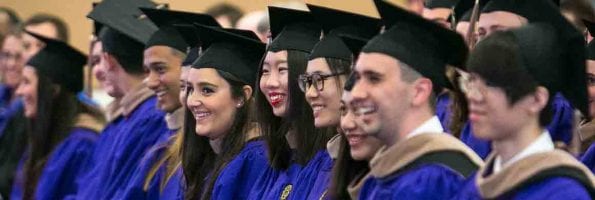
Last week, Northwestern University’s Kellogg School of Management released its 2018 Employment Report revealing a record number of graduates going into the tech industry (28 percent) and more companies hiring Kellogg talent than ever before. Other highlights include a growing number of graduates headed to the West Coast for jobs (around one-third) and a steady employment rate with 94.6 percent of students receiving a job offer three months post-graduation—a slight increase from 94.1 percent last year.

Kellogg Job Offers and Salaries Remain Stable
Over the last two years, Northwestern Kellogg has witnessed strong and steady base salaries and job offers with little to no change. Although the number of MBA graduates heading into consulting decreased slightly this year (down to 30.1 percent from 32.9 percent), the median salary was $147,000 for both years. The technology industry had similar results though interest increased year-over-year (24.9 percent in 2017 compared to 28.3 percent in 2018). Median base salaries in technology stayed consistent with just a slight increase from $125,000 in 2017 to $130,000 in 2018.
As for graduates seeking employment, in both 2017 and 2018, around 82 percent of MBA students were looking for a job. Of those students, 94.1 percent received an job offer last year compared to 94.6 percent this year.
“We are thrilled to see the continued strong demand for Kellogg talent across a diverse range of industries and geographies,” Kellogg admissions says.
Kellogg Students Head to the West Coast & Work at a Range of Companies
One of the most notable differences this year was the number of MBA graduates heading to the West Coast. Thirty-three percent of students took a job in the West, the highest percentage ever. That change correlated to a decrease in interest in the Midwest down to 26.1 percent from 30.2 percent. However, more students took an international job compared to last year (12.8 percent in 2018 compared to 10.9 percent in 2017).
Another stand out in this year’s employment report was the growing breadth of companies hiring Kellogg talent. Last year, 207 companies were responsible for employing all 500-odd students. This year, 228 companies hired MBA graduates, “illustrating that Kellogg equips its graduates for jobs anywhere,” Kellogg admissions wrote.
As for the top companies hiring graduates, that prestige went to The Boston Consulting Group and McKinsey & Company, both of which hired 33 grads. Other top employers included Bain & Company (24), Amazon (21), and Deloitte Consulting LLP (12).
This article has been edited and republished with permissions from its original source on Clear Admit.
Upcoming December MBA Application Deadlines

As winter approaches and December comes into clear view, let’s review all the major upcoming MBA application deadlines for December and January. Get those applications in ASAP so you have more time to enjoy the holidays with friends and family as you await your acceptance letter in 2019. Best of luck, and Happy New Year in advance! Continue reading…
